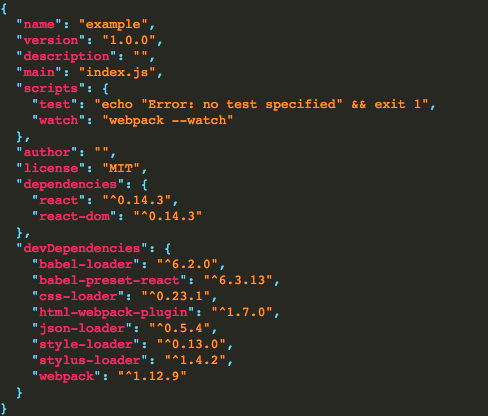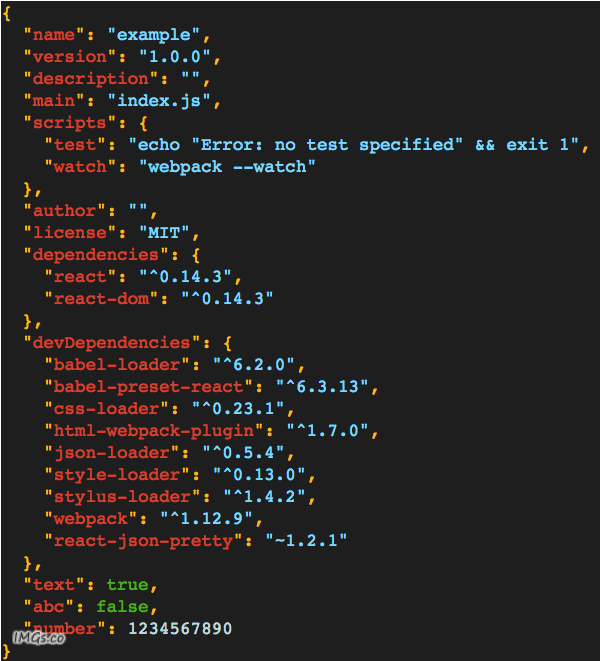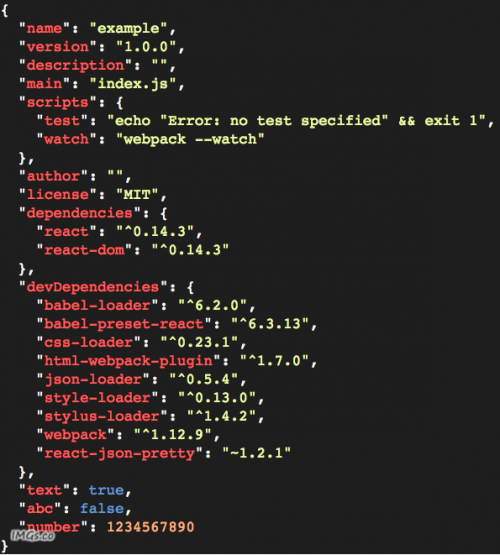React JSON Pretty




Introduction
This is a lightweight and tiny react component that helps you to format and prettify the JSON data.
Install
npm install --save react-json-pretty
Usage
Basic
The usage is quite simple, assuming that you already have an application using React. If you don't, visit Facebook React to create one or take a look at the example provided.
Firstly, you need to require the react-json-pretty:
var JSONPretty = require('react-json-pretty');
Or use the es2015 syntax with the help of tools like babel:
import JSONPretty from 'react-json-pretty';
Next, use it in your React component:
<JSONPretty id="json-pretty" data={yourData}></JSONPretty>
Where the property data is the JSON string or just a plain JavaScript object.
Lastly, you can add themes stated below.
Note: if yourData is not a plain object, use circular-json or other similar tools to preprocess it before being passed to JSONPretty.
Themes
Use themes with css-loader and webpack
And also you can import the style to the document, here is an example of using webpack loaders(style!css) to load style, You can visit webpack to get more details:
require('react-json-pretty/themes/monikai.css');
Or
import 'react-json-pretty/themes/monikai.css';
Use themes with theme property
If you don't want to use css, theme property is also available. Properties of theme will be used as style property of the target DOM element.
var JSONPrettyMon = require('react-json-pretty/dist/monikai');
<JSONPretty data={yourJSON} theme={JSONPrettyMon}></JSONPretty>
Visit the example to get some details.
The preview is as below:

Others
Error
Use onJSONPrettyError function property to get JSON.parse errors.
<JSONPretty data={invalid} onJSONPrettyError={e => console.error(e)}></JSONPretty>
Formation
Actually, react-json-pretty is based on JSON.stringify(value[, replacer[, space]]). However, JSON.stringify(value[, replacer[, space]]) has some optional parameters additionally such as replacer and space. This is also available in react-json-pretty.
Here is an example:
<JSONPretty data={yourData} replacer={
function (key, value) {
if (key === 'cccc') {
value += '~~~abc';
}
if (key === 'gggg') {
value *=10;
}
return value;
}
} space="4"
>
</JSONPretty>
Note: The default value for property replacer is null,and space is 2.
You can visit the example to see the details.
Custom themeClassName
Your can also define your custome themeClassName, the default value is __json-pretty__.
Note: this may lead to the usage of default themes provided with css being invalid.
<JSONPretty themeClassName="custom-json-pretty" data={yourData}></JSONPretty>
Custom Themes
There are some default themes provided including "Adventure Time", acai and 1337, to provide users more ready-made options.



All the css theme files are placed in the themes folder.
It is also prossible to define a custom theme:
Using typeStyle property
This can make control the extra styles of the specific type of value:
mainStyle?: string;
keyStyle?: string;
valueStyle?: string;
booleanStyle?: string;
stringStyle?: string;
errorStyle: string;
For example: set padding of the main area and the font size the normal value
<JSONPretty id="json-pretty" style={{fontSize: "1.1em"}} data={youJSON} mainStyle="padding:1em" valueStyle="font-size:1.5em"></JSONPretty>
Using themes property
Here is the property schema:
{
main?: string,
error?: string,
key?: string,
string?: string,
value?: string,
boolean?: string'
}
For example:
{
main: 'line-height:1.3;color:#66d9ef;background:#272822;overflow:auto;',
error: 'line-height:1.3;color:#66d9ef;background:#272822;overflow:auto;',
key: 'color:#f92672;',
string: 'color:#fd971f;',
value: 'color:#a6e22e;',
boolean: 'color:#ac81fe;',
}
Using css file
For example the monokai.styl:
.__json-pretty__
line-height 1.3
color rgba(248,248,242,1)
background #1e1e1e
overflow auto
.__json-key__
color rgba(255,94,94,1)
.__json-value__
color rgba(253,176,130,1)
.__json-string__
color rgba(233,253,172,1)
.__json-boolean__
color rgba(102,153,204,1)
.__json-pretty-error__
line-height 1.3
color rgba(248,248,242,1)
background #1e1e1e
overflow auto
License
MIT (http://www.opensource.org/licenses/mit-license.php)









